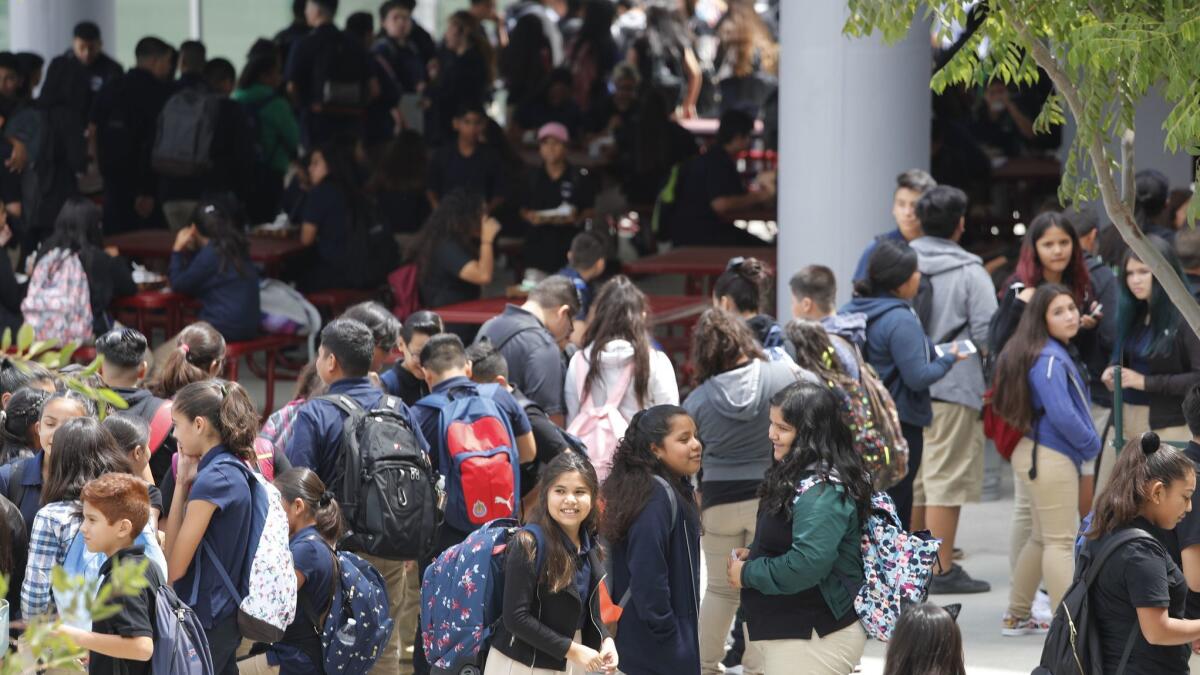L.A. school board approves $8.2-billion spending plan amid concerns over future

The Los Angeles school board on Tuesday approved an $8.2-billion spending plan for the next school year as expected, but also pledged support for a comparatively tiny amount of new spending to give students free college admissions tests and college savings accounts.
The school board also debated whether to ask local voters for more money in November through an annual tax on every parcel located within school district boundaries. Board members postponed a decision until July 10.
The budget, which has been under discussion for months, included no major surprises. As in previous meetings, senior district staff forecast that the nation’s second-largest school system was headed for financial disaster in four years, when they predict that reserves will have dried up.
After some hand-wringing, the Board of Education approved the plan, 6 to 1. The dissenting vote came from Scott Schmerelson. He voted no after calling unsuccessfully for an additional $5 million for a school-based reform plan supported by the teachers union and allied activists.
The entire board favored one new spending item: covering the costs of the college aptitude tests that many colleges require applicants to submit.
Under the plan, students will take the SAT or ACT during a regular school day, probably in March, in their own schools. The familiar surroundings should help with student performance on the test, said supporters, including board members and staff from the city and school district.
Based on a 10th-grade enrollment of 34,438 students, paying the fees for the tests should cost about $750,000. The estimate assumes that 85% of students will qualify for reduced rates because they come from low-income households. Initial training costs for staff to administer the tests could surpass $400,000. And extra help for students could cost close to that, although some free online resources are available.
The resolution also directs the superintendent to report back in 60 days with a plan to provide the PSAT, a practice test for the SAT, to all eighth-, ninth-, and 10th-grade students. The district already pays for 10th graders to take the test.
Separately, the board reiterated its support, by a formal vote, for a city-led plan to create a college savings account for every first-grader. Each account would get $50 in seed money and the plan would be rolled out over five years.
“Just opening an account and putting that money away starts that college statement, that mentality,” board member Nick Melvoin said.
“We’re putting students on the path toward higher learning,” board member Kelly Gonez said.
The preliminary planning for such accounts has taken two years, with city staffers exploring different options for how the accounts could work.
Later in the meeting, school board member George McKenna put forward a plan to try to slow or even reverse the district’s projected slide toward insolvency.
McKenna proposed a parcel tax for the November ballot that would raise $150 million a year. Passing the measure would require a two-thirds majority.
There’s much debate in districts across the state about whether the November election is likely to be a favorable moment for parcel taxes and school construction bonds.
L.A. schools Supt. Austin Beutner did not get involved in Tuesday’s debate, but sources within the district suggest that he’s concerned that the timing is not yet right. McKenna alluded to that presumed hesitancy.
“Mr. superintendent, with respect to your position, all you have to do is say go …. and the people in this district will go,” McKenna said. “I’m advocating for a now, a boldness and an urgency.”
Several board members expressed concern about the expense of a ballot measure and fear that voters’ rejection then might hurt the district’s chances in a later election.
“I am concerned that there has to be a strategy to win, not just a strategy to put on the ballot,” school board President Monica Garcia said.
More to Read
Start your day right
Sign up for Essential California for news, features and recommendations from the L.A. Times and beyond in your inbox six days a week.
You may occasionally receive promotional content from the Los Angeles Times.







